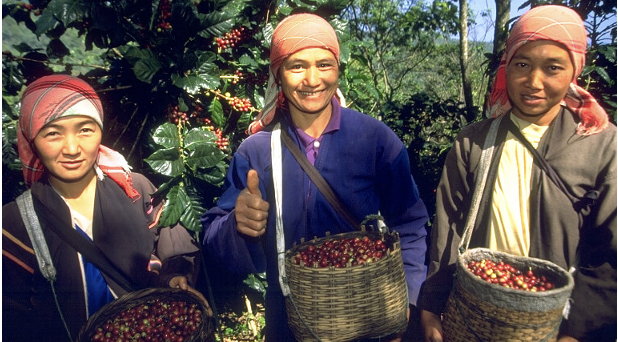Context:
Over thirty years ago, Doi Tung, the mountainous area in the Thai highlands of Chiang Rai, was isolated and underdeveloped. Poverty was rampant among the predominantly ethnic hill tribes. The villagers often led an illicit livelihood of narcotic crop cultivation and trafficking for militia groups. They also lacked agricultural know-how, skills and employment opportunities to escape the vicious cycle of poverty and illegal activity. Consequently, many were forced into sex trafficking and the drug trade.
Implementation of programme/ initiative:
Started by the Thai Princess Mother in 1988 and funded by the government, the royal family and international benefactors, the Doi Tung Development Project began as an alternative lifestyle initiative. The project aimed to improve the quality of life of the villagers, with an emphasis on self-sufficiency and sustainability. The first step comprised the provision of public amenities and health care to alleviate hunger in the local communities. Members of the development staff were also sent into the field to conduct surveys of the villages to evaluate their problems firsthand. Soon after, the local communities in Doi Tung were able to cultivate economic crops, namely coffee and macadamia nuts. The subsequent phase targeted environmental restoration and the promotion of livelihoods suitable to the geo-social conditions in order to foster knowledge among the local communities and create sustainable incomes. The success of the project led to the creation of the DoiTung brand in 2000, allowing it to be completely self-reliant. Part of the proceeds from the social enterprise are reverted to the villagers themselves and used to further improve the public health, education and environment of the area.
Main challenges:
Despite the vast resources that were poured into the project, the Doi Tung Development Project was far from an overnight success. The initial phase alone covered several months of data collection and communication with the locals. Time was needed to build up imperative infrastructure as well as trust with the local communities. Moreover, the project overseers understood that merely dumping resources into the area would not be enough to create a sustainable solution for the villagers to escape the cycle of poverty. Thus, they worked to ensure that the villagers were able to create their own income and that the promoted livelihoods were translated intergenerationally. For instance, the project began incorporating Thai language lessons into the curriculum for ethnic children in the area in 2016 to help overcome communication challenges.
Results achieved:
The Doi Tung Development Project has had a transformative impact on the area, especially among ethnic minority groups. The average household income rose 20-fold, from $802 in 1988 to $19,200 in 2018. Opium cultivation was eliminated entirely and health care continues to be provided for all. A total of 99 per cent of 7-15 years old have been enrolled in formal education as of 2018. Moreover, the project’s forest management and forest fire prevention rule restored the total forest area from 28.0 to 86.8 per cent. The DoiTung brand continues to be successful and self-sustainable, using 30 per cent of its expenditure to employ over 1,700 staff and 9 per cent of its profit to invest in scholarships and social enterprises.
Moving Forward:
The Doi Tung residents are currently in the last development phase of “sustainability,” where great emphasis is placed on the education of youth. As noted, the project recently began including Thai language lessons in the curriculum for ethnic children; this is part of an effort to reduce the number of illiterate children and enhance human capital.
Replicability:
The Doi Tung Development Project currently serves as a model for sustainable development, environmental management, minority rights and social entrepreneurship. It shows the value of investing in young people (including through education and skills development), building trust and developing sustainable employment opportunities in communities. Furthermore, its success has prompted numerous projects under the Mae Fah Luang Foundation, including the Hall of Opium and Golden Triangle Park. The model has also been replicated outside of Thailand. For instance, Antonio Maria Costa, a veteran of UNODC, was inspired by the accomplishments of the Doi Tung Development Project and went on to create the Africa Educational Fund. Furthermore, Colombia has enlisted the consultancy of the Mae Fah Luang Foundation in its efforts to combat rampant drug production and promote sustainable development.
References:
https://www.bangkokpost.com/thailand/special-reports/1266167/lessons-from-doi-tung
This good practice was kindly prepared by Mr. Yosathorn Niamsaing
Project Details
Date: August 25, 2023
